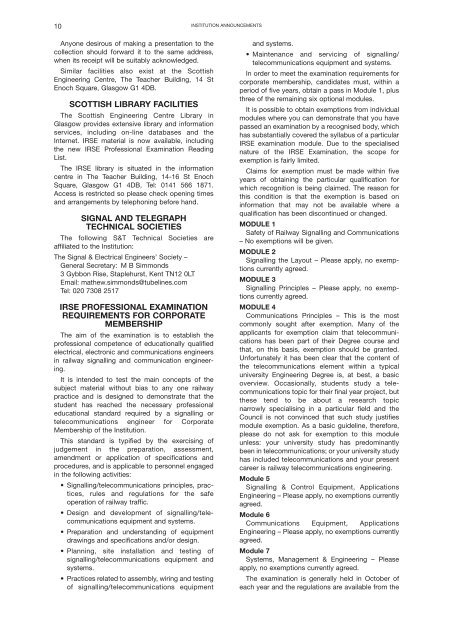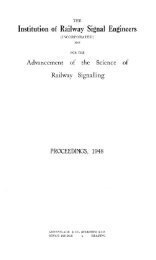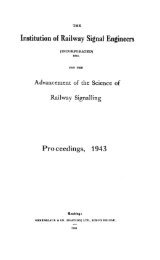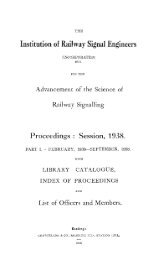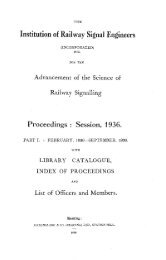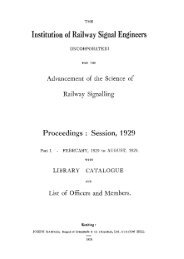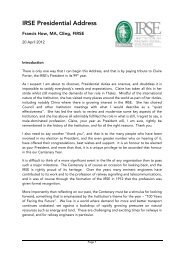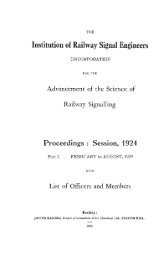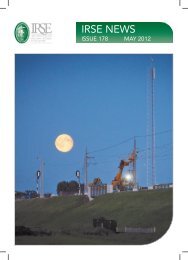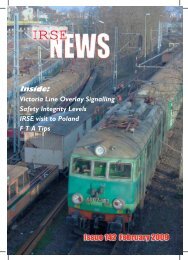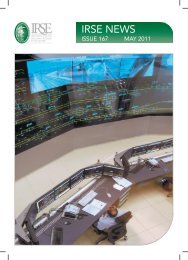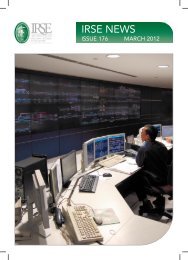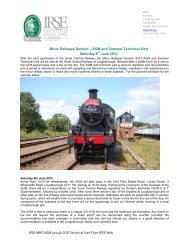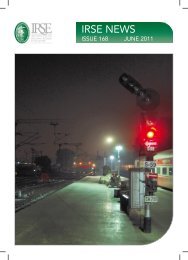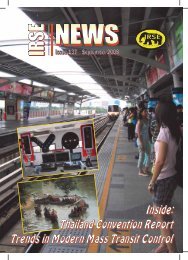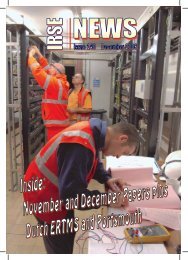Proceedings 2002/2003 - IRSE
Proceedings 2002/2003 - IRSE
Proceedings 2002/2003 - IRSE
Create successful ePaper yourself
Turn your PDF publications into a flip-book with our unique Google optimized e-Paper software.
10<br />
INSTITUTION ANNOUNCEMENTS<br />
Anyone desirous of making a presentation to the<br />
collection should forward it to the same address,<br />
when its receipt will be suitably acknowledged.<br />
Similar facilities also exist at the Scottish<br />
Engineering Centre, The Teacher Building, 14 St<br />
Enoch Square, Glasgow G1 4DB.<br />
SCOTTISH LIBRARY FACILITIES<br />
The Scottish Engineering Centre Library in<br />
Glasgow provides extensive library and information<br />
services, including on-line databases and the<br />
Internet. <strong>IRSE</strong> material is now available, including<br />
the new <strong>IRSE</strong> Professional Examination Reading<br />
List.<br />
The <strong>IRSE</strong> library is situated in the information<br />
centre in The Teacher Building, 14-16 St Enoch<br />
Square, Glasgow G1 4DB, Tel: 0141 566 1871.<br />
Access is restricted so please check opening times<br />
and arrangements by telephoning before hand.<br />
SIGNAL AND TELEGRAPH<br />
TECHNICAL SOCIETIES<br />
The following S&T Technical Societies are<br />
affiliated to the Institution:<br />
The Signal & Electrical Engineers’ Society –<br />
General Secretary: M B Simmonds<br />
3 Gybbon Rise, Staplehurst, Kent TN12 0LT<br />
Email: mathew.simmonds@tubelines.com<br />
Tel: 020 7308 2517<br />
<strong>IRSE</strong> PROFESSIONAL EXAMINATION<br />
REQUIREMENTS FOR CORPORATE<br />
MEMBERSHIP<br />
The aim of the examination is to establish the<br />
professional competence of educationally qualified<br />
electrical, electronic and communications engineers<br />
in railway signalling and communication engineering.<br />
It is intended to test the main concepts of the<br />
subject material without bias to any one railway<br />
practice and is designed to demonstrate that the<br />
student has reached the necessary professional<br />
educational standard required by a signalling or<br />
telecommunications engineer for Corporate<br />
Membership of the Institution.<br />
This standard is typified by the exercising of<br />
judgement in the preparation, assessment,<br />
amendment or application of specifications and<br />
procedures, and is applicable to personnel engaged<br />
in the following activities:<br />
• Signalling/telecommunications principles, practices,<br />
rules and regulations for the safe<br />
operation of railway traffic.<br />
• Design and development of signalling/telecommunications<br />
equipment and systems.<br />
• Preparation and understanding of equipment<br />
drawings and specifications and/or design.<br />
• Planning, site installation and testing of<br />
signalling/telecommunications equipment and<br />
systems.<br />
• Practices related to assembly, wiring and testing<br />
of signalling/telecommunications equipment<br />
and systems.<br />
• Maintenance and servicing of signalling/<br />
telecommunications equipment and systems.<br />
In order to meet the examination requirements for<br />
corporate membership, candidates must, within a<br />
period of five years, obtain a pass in Module 1, plus<br />
three of the remaining six optional modules.<br />
It is possible to obtain exemptions from individual<br />
modules where you can demonstrate that you have<br />
passed an examination by a recognised body, which<br />
has substantially covered the syllabus of a particular<br />
<strong>IRSE</strong> examination module. Due to the specialised<br />
nature of the <strong>IRSE</strong> Examination, the scope for<br />
exemption is fairly limited.<br />
Claims for exemption must be made within five<br />
years of obtaining the particular qualification for<br />
which recognition is being claimed. The reason for<br />
this condition is that the exemption is based on<br />
information that may not be available where a<br />
qualification has been discontinued or changed.<br />
MODULE 1<br />
Safety of Railway Signalling and Communications<br />
– No exemptions will be given.<br />
MODULE 2<br />
Signalling the Layout – Please apply, no exemptions<br />
currently agreed.<br />
MODULE 3<br />
Signalling Principles – Please apply, no exemptions<br />
currently agreed.<br />
MODULE 4<br />
Communications Principles – This is the most<br />
commonly sought after exemption. Many of the<br />
applicants for exemption claim that telecommunications<br />
has been part of their Degree course and<br />
that, on this basis, exemption should be granted.<br />
Unfortunately it has been clear that the content of<br />
the telecommunications element within a typical<br />
university Engineering Degree is, at best, a basic<br />
overview. Occasionally, students study a telecommunications<br />
topic for their final year project, but<br />
these tend to be about a research topic<br />
narrowly specialising in a particular field and the<br />
Council is not convinced that such study justifies<br />
module exemption. As a basic guideline, therefore,<br />
please do not ask for exemption to this module<br />
unless: your university study has predominantly<br />
been in telecommunications; or your university study<br />
has included telecommunications and your present<br />
career is railway telecommunications engineering.<br />
Module 5<br />
Signalling & Control Equipment, Applications<br />
Engineering – Please apply, no exemptions currently<br />
agreed.<br />
Module 6<br />
Communications Equipment, Applications<br />
Engineering – Please apply, no exemptions currently<br />
agreed.<br />
Module 7<br />
Systems, Management & Engineering – Please<br />
apply, no exemptions currently agreed.<br />
The examination is generally held in October of<br />
each year and the regulations are available from the


